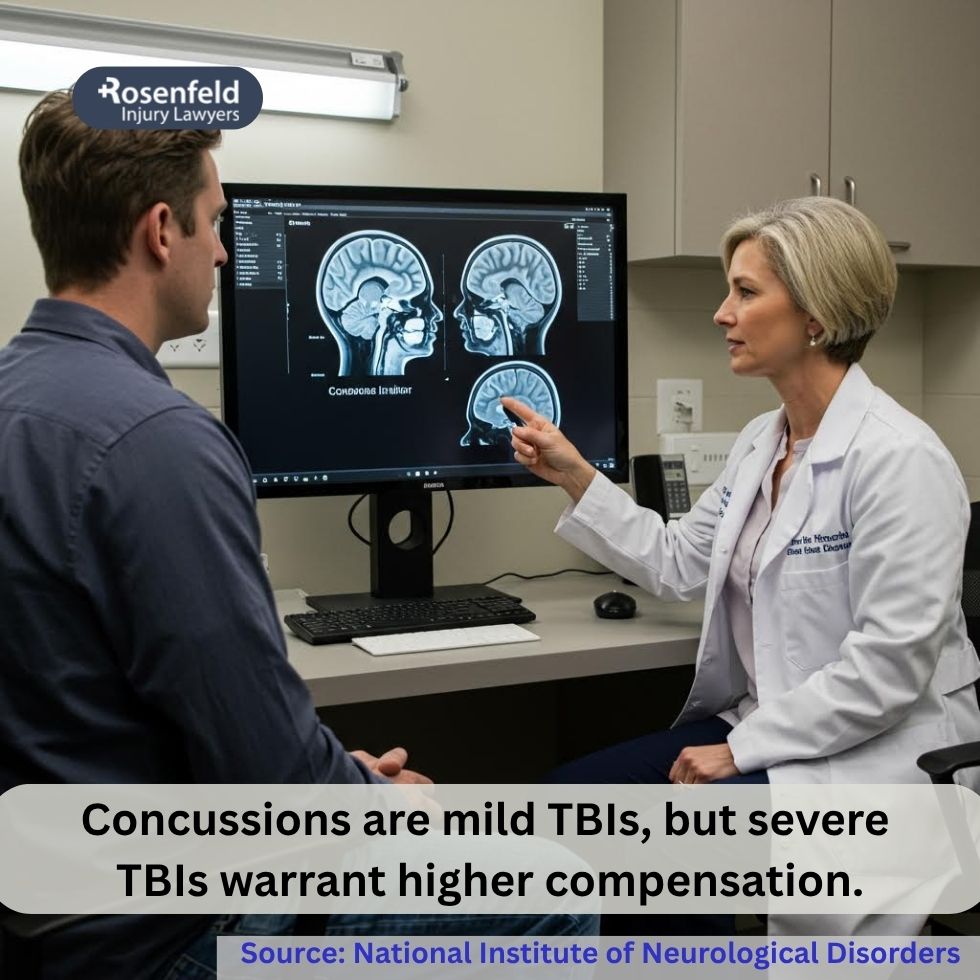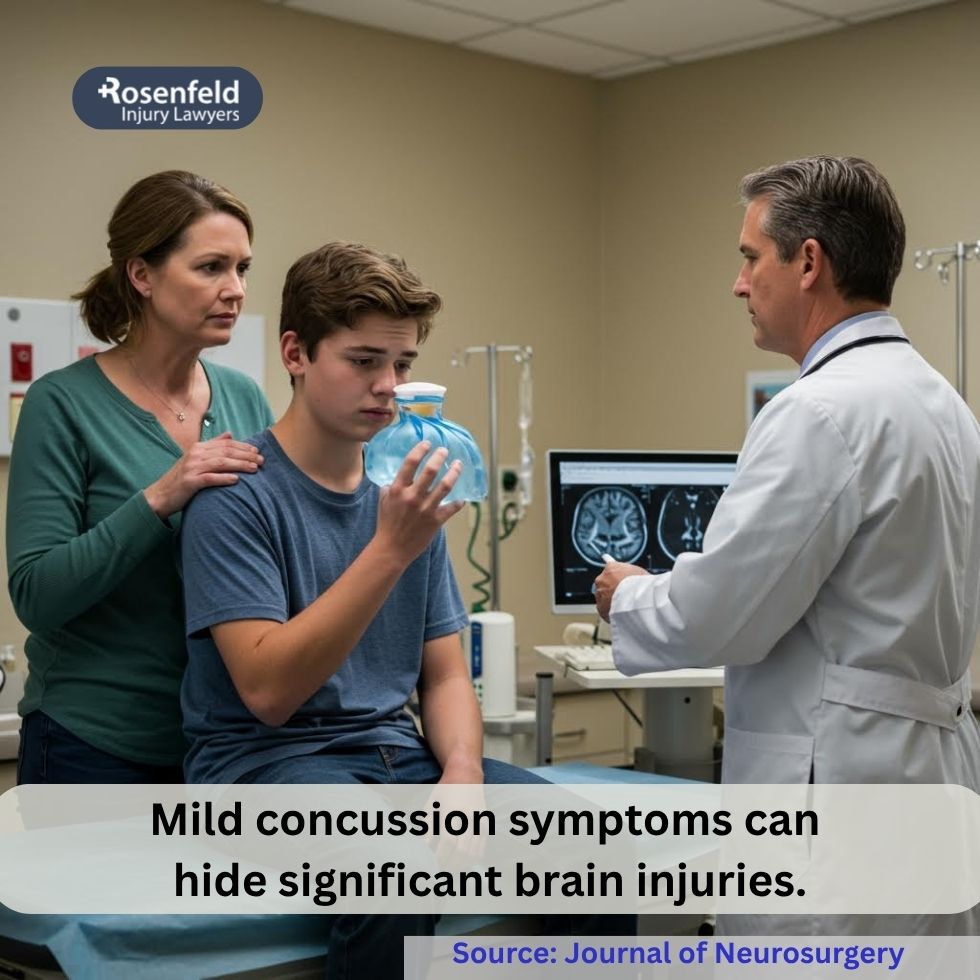- 24/7 Free Consultation: (888) 424-5757 Tap Here To Call Us
What’s The Difference Between Concussion and TBI?

Head injuries often occur in Illinois personal injury cases, especially in urban areas like Chicago, where car crashes, construction accidents, and slips and falls are common. If you were hurt due to someone else’s negligence, such as in a downtown collision or a fall, you may be entitled to seek compensation. Before discussing how these injuries impact compensation, it’s important to understand the medical and legal difference between concussion and TBI claims.
Serious injuries like concussions and traumatic brain injuries (TBIs) often require significant medical care and can cause lasting physical, cognitive, and emotional challenges. If you were diagnosed with a concussion or TBI in Illinois, it can substantially impact the value of your personal injury claim.
What is a Traumatic Brain Injury (TBI)?
A traumatic brain injury is a broad category that describes any injury affecting normal brain function. The severity of this type of injury varies widely. Many TBIs have a mild effect on brain cells, while others can cause permanent brain damage that alters the victim’s lifestyle.
A traumatic brain injury, typically caused by external forces damaging brain tissue, can affect your cognitive function, emotions, behavior, and physical movement.
Traumatic brain injuries can have varying effects on the individual. A mild TBI may not exhibit many symptoms, and the individual may simply have a minor headache. On the other end of the spectrum, a severe injury to the brain could cause lifelong disabilities or permanent damage.
You could lose your ability to remember things or move around without limitations. The more severe your brain injury is, the longer the road to recovery, if there is one.

Concussions: A Mild Traumatic Brain Injury
A mild TBI, commonly referred to as a concussion, often occurs after a forceful bump or blow to the head. Motor vehicle crashes, falls, and playing sports are all leading causes of these types of injuries. While a moderate injury might seem less concerning, it can still involve chemical changes in the brain and temporary damage to nerve cells.
Common Causes of Concussions
Since concussions can occur from a bump to the head, there are many causes. Falls, car accidents, contact sports injuries, falling objects, adventure activities, and sudden jolts could all throw the brain violently against the inside of the skull and cause a concussion.
Concussion Symptoms
If you suffer a head injury that leads to a concussion, you may experience non-life-threatening symptoms. Headaches, dizziness, confusion, memory problems, and vision issues are all common indicators of concussions. If you notice these symptoms after an accident, you should schedule an appointment with a medical professional immediately.
Distinguishing Concussions from A More Severe Head Injury
Recognizing the difference between a minor traumatic brain injury and a major TBI is crucial for healing and legal considerations. Certain symptoms, such as persistent memory loss, ongoing confusion, or physical decline, can point toward significant brain injuries that require immediate attention. Here are important ways to tell the difference and know when to seek further treatment.
Mild TBI and the Role of Health Care Providers
Healthcare providers, such as athletic trainers or physicians, play an important role in evaluating symptoms. Through a physical examination and detailed history of the trauma, they can determine whether evidence like difficulty concentrating, sensitivity to light, and headaches indicate a moderate concussion that will resolve in a few weeks or something more serious.
When Severe TBI Requires Immediate Medical Attention
If symptoms last beyond a few hours or worsen significantly, the possibility of a more severe traumatic brain injury must be considered. Serious TBI can cause lasting damage to brain tissue and nerve fibers, especially if brain swelling or bleeding occurs.
Common warning signs that demand immediate medical attention include:
- Prolonged memory loss
- Worsening confusion or agitation
- Loss of consciousness lasting longer than a few minutes
- Slurred speech or seizures
- Difficulty awakening

When to Go to the Emergency Department for a TBI
A person should seek immediate care if a head injury causes loss of consciousness, vomiting, weakness in the body, or confusion. Patients experiencing these symptoms after a blow should go to the emergency room without delay. A CT scan can detect hidden brain tissue damage or bleeding that physical exams alone might miss. Early diagnosis is crucial in getting patients the treatment they need to prevent serious complications.
Using Imaging Tests to Diagnose the Extent of Injury
Most simple concussions do not appear on imaging. However, serious brain injuries caused by motor vehicle crashes, falls, or playing sports may lead to structural damage visible on a CT scan or MRI. Scans can reveal issues such as skull fractures, brain swelling, bleeding, or signs of chronic traumatic encephalopathy developing over time.
Doctors use these imaging results, along with a physical examination, to determine whether the patient can resume normal activities with rest or if additional treatment is necessary to prevent worsening effects.
Long-Term Effects and Complications
Even a minor TBI can lead to serious complications if patients do not rest or follow a proper rehabilitation plan. Persistent symptoms, known as post-concussion syndrome, may last for weeks or months, especially if consciousness was lost at the time of the injury.
A second concussion before full recovery increases the risk of permanent damage, affecting memory, motor skills, and overall body function. Repeated head damage can lead to cognitive decline, emotional instability, and long-term disability.
In severe cases, a traumatic brain injury can cause lasting impairments, including difficulty with concentration, personality changes, and loss of independence.
Legal Implications of Concussions and TBIs in Illinois
In Illinois, your compensation can be reduced if you are partially at fault for your accident. Even without a helmet or delayed medical attention, you can still recover damages if the patients are less than 50% responsible for their TBI. A personal injury attorney can help protect your rights and fight arguments aimed at lowering your brain injury settlement.
Personal Injury Claims in Illinois
In Illinois, a person can file a personal injury lawsuit against the party responsible for the accident. Concussions and traumatic brain injuries are frequently listed among the damages claimed, particularly after car crashes, falls, or workplace accidents in busy areas like Chicago. To recover compensation, the injured party must prove that the other party’s negligence directly caused their TBI and related losses.
Illinois Statute of Limitations
Under Illinois law (735 ILCS 5/13-202), a person injured by a concussion or TBI generally has two years from the date of the injury to file a lawsuit. Patients under 18 typically have until two years after their 18th birthday. Delaying can hurt your ability to prove damages and recover full compensation.
Proving Damages After a Concussion or TBI
Successfully proving damages requires strong documentation. Patients must present evidence such as CT scans, hospital bills, and expert medical testimony to show the true impact of the injury. In Illinois, damages can include reimbursement for medical expenses, lost wages, emotional distress, pain and suffering, and loss of enjoyment of life. Since TBIs often involve subtle or delayed symptoms, building a thorough, medically supported case is essential for full and fair recovery under Illinois law.
Get a Free Consultation with Expert Lawyers Today

A serious head injury can disrupt your life and finances. Our Chicago brain injury lawyers are ready to help you prove damages, hold the at-fault party accountable, and pursue full compensation. We offer a free consultation to discuss your legal options.
Call us today at 888-424-5757 or use our contact form to consult a personal injury lawyer in Chicago.
All content undergoes thorough legal review by experienced attorneys, including Jonathan Rosenfeld. With 25 years of experience in personal injury law and over 100 years of combined legal expertise within our team, we ensure that every article is legally accurate, compliant, and reflects current legal standards.







